外研版英语八年级上册 Module 1 Unit 1 Let's try to speak English as much as possible.课件 (共53张PPT)
文档属性
| 名称 | 外研版英语八年级上册 Module 1 Unit 1 Let's try to speak English as much as possible.课件 (共53张PPT) | 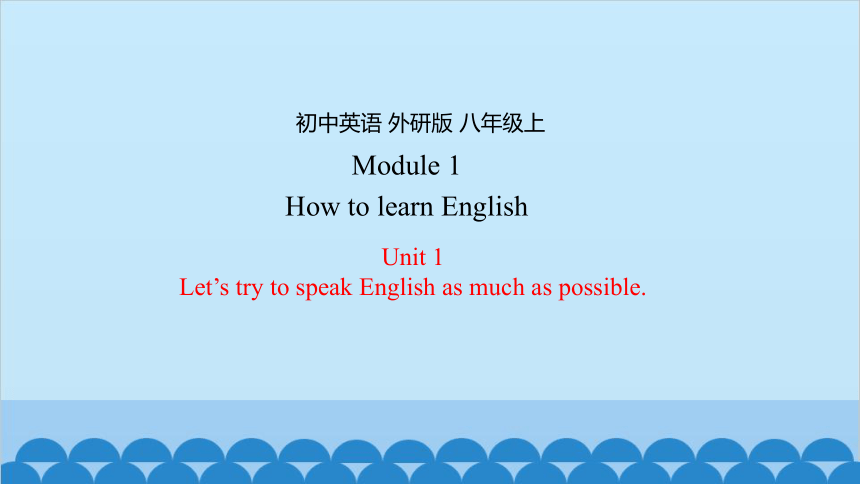 | |
| 格式 | pptx | ||
| 文件大小 | 5.7MB | ||
| 资源类型 | 教案 | ||
| 版本资源 | 外研版 | ||
| 科目 | 英语 | ||
| 更新时间 | 2023-08-13 22:29:22 | ||
图片预览

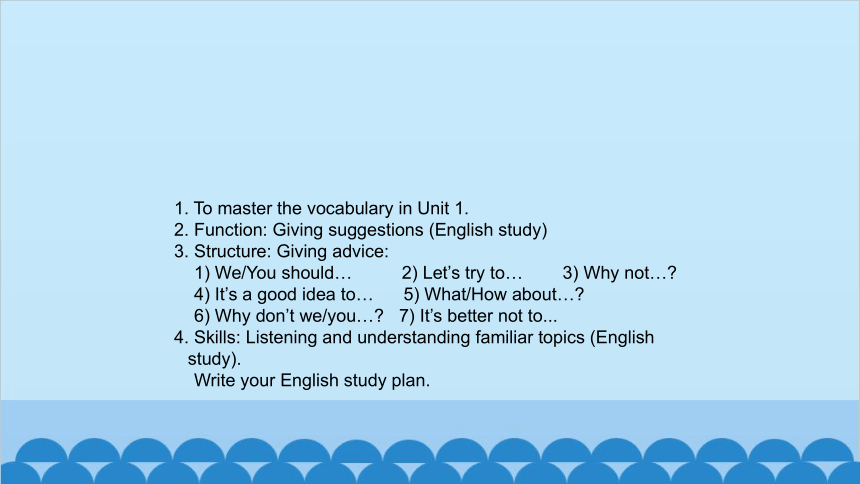
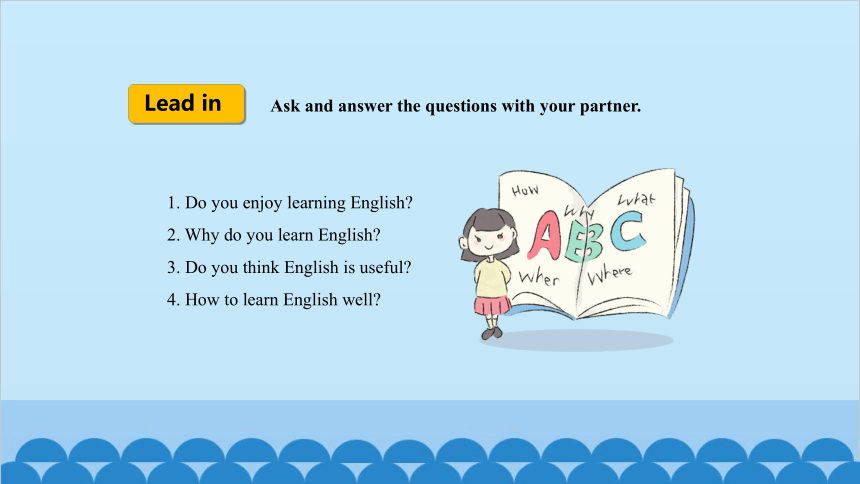

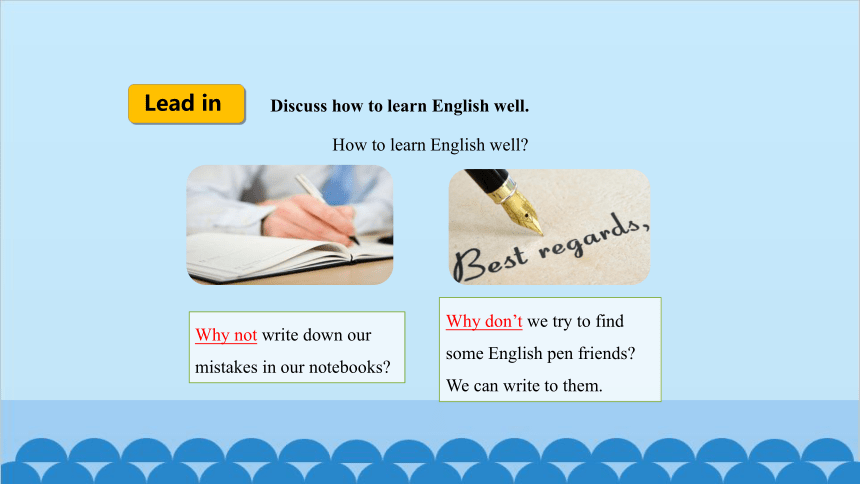
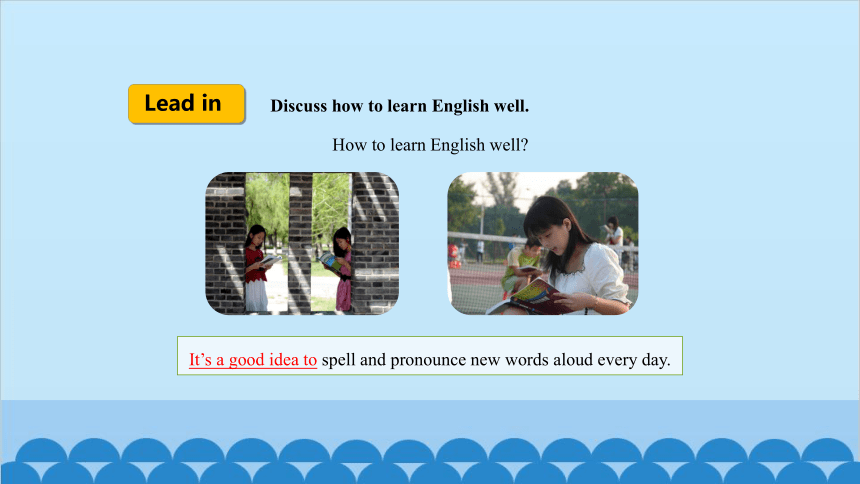

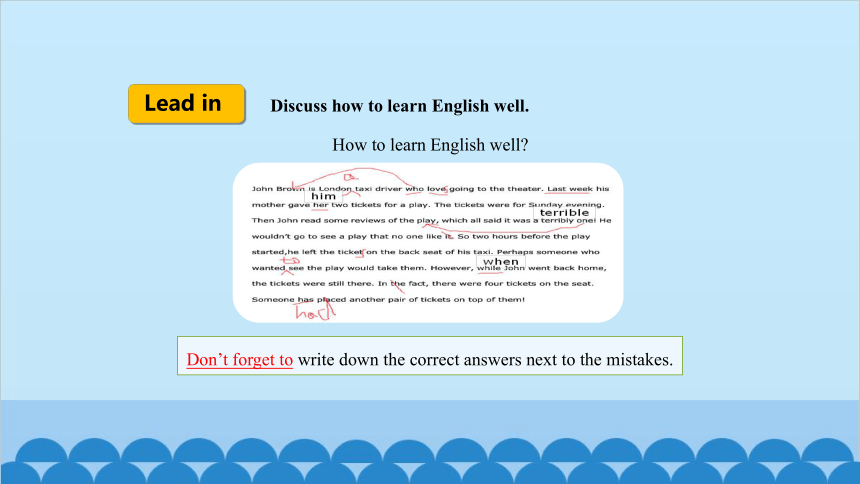
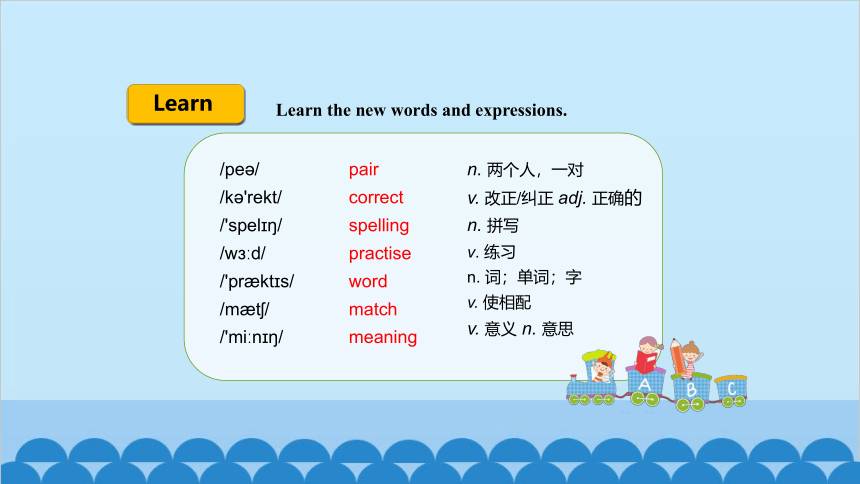
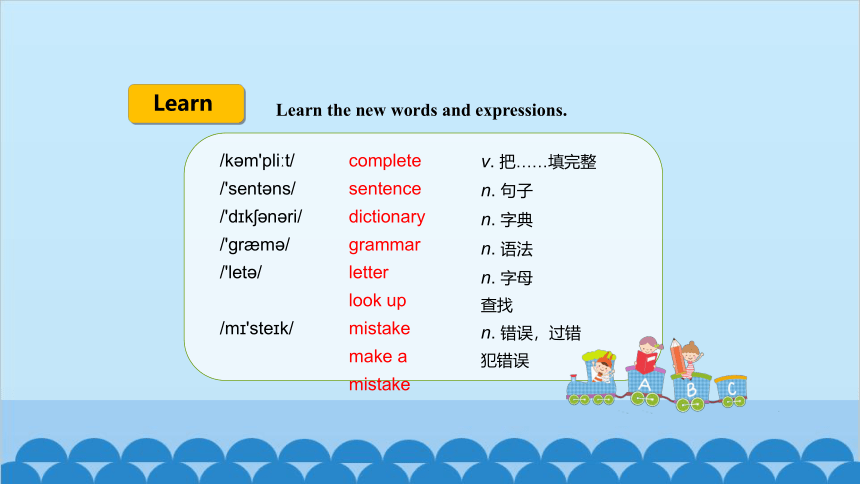
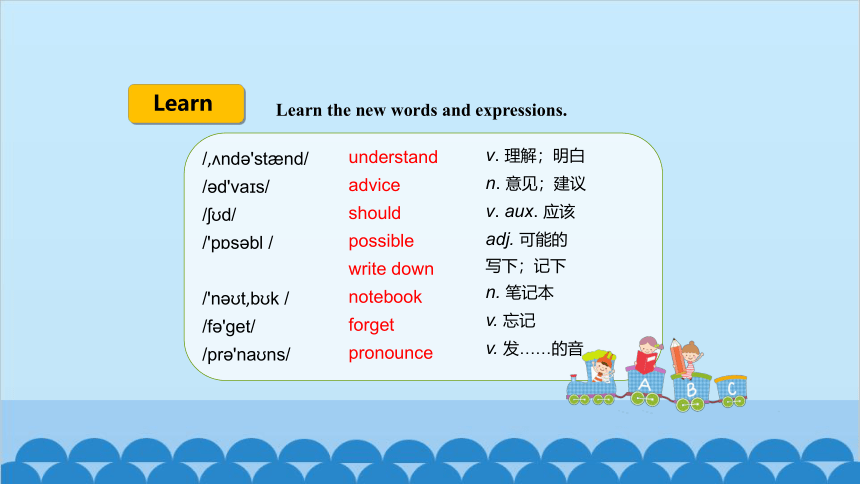
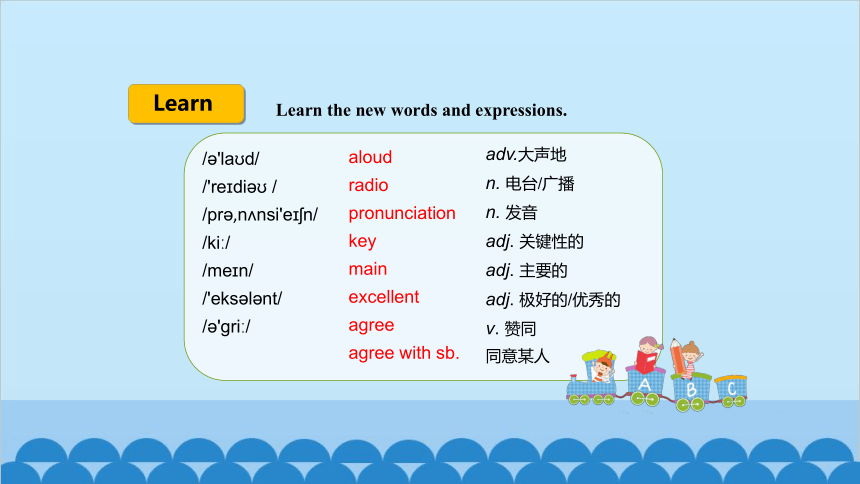
文档简介
(共53张PPT)
初中英语 外研版 八年级上
Unit 1
Let’s try to speak English as much as possible.
Module 1
How to learn English
1. To master the vocabulary in Unit 1.
2. Function: Giving suggestions (English study)
3. Structure: Giving advice:
1) We/You should… 2) Let’s try to… 3) Why not…
4) It’s a good idea to… 5) What/How about…
6) Why don’t we/you… 7) It’s better not to...
4. Skills: Listening and understanding familiar topics (English study).
Write your English study plan.
1. Do you enjoy learning English
2. Why do you learn English
3. Do you think English is useful
4. How to learn English well
Ask and answer the questions with your partner.
Lead in
We should always speak English in class.
Let’s try to speak English as much as possible.
How to learn English well
Discuss how to learn English well.
Lead in
Why not write down our mistakes in our notebooks
Why don’t we try to find some English pen friends We can write to them.
How to learn English well
Discuss how to learn English well.
Lead in
It’s a good idea to spell and pronounce new words aloud every day.
How to learn English well
Discuss how to learn English well.
Lead in
How to learn English well
Discuss how to learn English well.
Lead in
How about listening to the radio or reading English stories
Don’t forget to write down the correct answers next to the mistakes.
How to learn English well
Discuss how to learn English well.
Lead in
Learn the new words and expressions.
Learn
/pe /
/k 'rekt/
/'spel /
/w d/
/'pr kt s/
/m t /
/'mi n /
n. 两个人,一对
v. 改正/纠正 adj. 正确的
n. 拼写
v. 练习
n. 词;单词;字
v. 使相配
v. 意义 n. 意思
pair
correct
spelling
practise
word
match
meaning
Learn
/k m'pli t/
/'sent ns/
/'d k n ri/
/'gr m /
/'let /
/m 'ste k/
v. 把……填完整
n. 句子
n. 字典
n. 语法
n. 字母
查找
n. 错误,过错
犯错误
complete
sentence
dictionary
grammar
letter
look up
mistake
make a mistake
Learn the new words and expressions.
Learn
Learn the new words and expressions.
Learn
/ nd 'st nd/
/ d'va s/
/ d/
/'p s bl /
/'n t,b k /
/f 'get/
/pr 'na ns/
v. 理解;明白
n. 意见;建议
v. aux. 应该
adj. 可能的
写下;记下
n. 笔记本
v. 忘记
v. 发……的音
understand
advice
should
possible
write down
notebook
forget
pronounce
Learn the new words and expressions.
Learn
/ 'la d/
/'re di /
/pr n nsi'e n/
/ki /
/me n/
/'eks l nt/
/ 'gri /
adv.大声地
n. 电台/广播
n. 发音
adj. 关键性的
adj. 主要的
adj. 极好的/优秀的
v. 赞同
同意某人
aloud
radio
pronunciation
key
main
excellent
agree
agree with sb.
1. Work in pairs. Ask and answer the questions.
2. Correct the spelling.
3. Listen and check the words you hear.
4. Practise saying the words.
5. Match the words with their meanings.
6. Complete the sentences with the words in the box.
√
√
√
√
√
√
1
Read the instructions and check(√) the ones you understand.
dictionary grammar letter look up make a mistake understand
1. Which word did Daming not understand
2. What mistake did Lingling make
3. How does Daming usually check the spelling of a word
4. Why was it difficult for Daming to check the spelling of cinema
He didn’t understand the word “spring”.
She made a grammar mistake. She said “go” instead of “went”.
He looks it up in the dictionary.
Because he didn’t know the first letter.
2
Listen and answer the questions. Use the words and expressions in the box.
Ms James: Welcome back, everyone! Today, we’re going to talk about
good ways to learn English. Ready Who has some advice
Lingling: We should always speak English in class.
Ms James: Good! Let’s try to speak English as much as possible.
Daming: Why not write down the mistakes in our notebooks
Ms James: That’s a good idea. And don’t forget to write down the
correct answers next to the mistakes. What else
3
Listen and read.
Lingling: It’s a good idea to spell and pronounce new words aloud
every day.
Ms James: Thanks a lot, Lingling. How about listening to the radio
Daming: Yes, that’s good for our pronunciation too. But there are so
many new words.
Ms James: You don’t need to understand every word. You just need to
listen for key words and main ideas.
3
Listen and read.
Ready
That’s a good idea.
What else
Thanks a lot.
Excellent!
Daming: That’s the same for reading. English stories
are so interesting. I get to know a lot about
the world through reading.
Lingling: I think writing is also important. Why don’t
we try to find some English pen friends. We
can write to them.
Ms James: Excellent! I agree with you.
3
Listen and read.
Everyday English
做某事的方法
尽力做/努力做某事
尽力不做/努力不做某事
忘记做某事
记得要做某事
需要做某事
做某事是一个好主意
ways to do sth
try to do sth
try not to do sth
forget to do sth
remember to do sth
need to do sth
It’s good idea to do sth
Practice
Learn the phrases by heart.
谈论某事
与某人交谈
一条建议
一些建议
提建议
尽可能多地讲……
犯错误
写下
talk about sth
talk with sb
a piece of advice
some advice
give advice
speak…as much as possible
make a mistake
write down
Practice
Learn the phrases by heart.
听录音
对……有好处
开始很了解某事
笔友
写信给某人
同意某人
同意某事
练习做某事
查找
listen to the radio
be good for…
get to know a lot about sth
pen friends
write to sb
agree with sb
agree on sth
practise doing sth
look up (look it up/look them up/look for)
Practice
Learn the phrases by heart.
互相合作
改正拼写
校对单词
将……和……配对
用……完成……
校对拼写
对于某人来说做某事怎么样
欢迎回来
work in pairs
correct the spelling
check the words
match … with …
complete… with …
check the spelling
it is +adj.+for+sb.+to do sth.
welcome back
Practice
Learn the phrases by heart.
大声拼读
听……怎么样
听关键单词
主要意思
为什么不做……
其他什么
别的什么东西
pronounce aloud
how about listening to …
listen for key words
main ideas
why not do… = why don’t you do…
what else
something else
Practice
Learn the phrases by heart.
Practice
Find out the sentences about how to learn English.
How to learn English well
1. We should always speak English in class.
2. Let’s try to speak English as much as possible.
3. Why not write down the mistakes in our notebooks
4. Don’t forget to write down the correct answers next to the mistakes.
5. It’s a good idea to spell and pronounce new words aloud every day.
6. How about listening to the radio
7. What about reading English stories
8. Why don’t we try to find some English pen friends
3
Now write notes about learning English.
Listening: listen to the radio
Speaking:______________________________________________
______________________________________________
Reading: ______________________________________________
______________________________________________
Writing: ______________________________________________
Learning new words: ______________________________________
always speak English in class / try to speak English
as much as possible; listen to the radio
just need to understand key words and main ideas;
read English stories
try to find some English pen friends and write to them
spell and pronounce new words aloud every day
知识讲解
1. Why not write down our mistakes in our notebooks
你为什么不把错误记在笔记本上?
(1) Why not do sth 相当于Why don’t you do sth 是典型的表示建议的句型。
(2) write down 写下,记下,是个 “动副短语”。
①当名词作宾语时, 可以在 down之前,也可以在 down 之后。
Please write down your name. =Please write your name down.
②代词作宾语时, 代词只能放在write和down之间。类似的动副短语:
put on 穿上 take away 拿走 turn on 打开
ring up 给……打电话 turn off 关上 take off 脱下
2. Let’s try to speak English as much as possible.
让我们尽可能地多说英语。
(1) try to do sth. 努力做某事
try doing sth. 试着做某事
You must try to be more careful.
你可要多加小心。
I tried gardening but didn't succeed.
我试着种果木花卉,但未成功。
知识讲解
知识讲解
2. Let’s try to speak English as much as possible.
让我们尽可能地多说英语。
(2) as much as possible 尽量,尽最大努力(可能)。
You should rest as much as possible.
你应当尽量多休息。
I will help you as much as possible.
我将会尽我所能地帮助你。
3. And don’t forget to write down the correct answers next to the mistakes.
不要忘记把正确的答案写在错误旁。
(1) forget to do 表忘了应该去做某事;
forget doing 表忘记过去已经做过某事。
I forgot bringing my books here.
我忘记把书带到这里了。(实际上我已经把书带到这里了。)
I forgot to close the windows.
我忘记关窗户了。(我没有关窗户。)
知识讲解
3. And don’t forget to write down the correct answers next to the mistakes.
不要忘记把正确的答案写在错误旁。
(2) correct 有两种词性
用作形容词时,意为“正确的,无误的”;
I’m not sure of the correct spelling.
我拿不准拼写是否正确。
用作动词时,意为“改正,纠正”。
Correct my pronunciation if it’s wrong.
如果我的发音错了,请予以纠正。
知识讲解
4. What else 还有别的什么吗?
【辨析】other与 else
(1) other与 else都有 “别的,其他的” 之意。
(2) other修饰名词,位于名词之前。
What’s that in your other hand
你的另一只手里拿着什么?
(3) else修饰不定代词、疑问代词或疑问副词,必须位于这些词之后。
Where else did you go
你还去了别的什么地方?
知识讲解
5. It’s a good idea to spell and pronounce new words aloud.
大声拼读出新单词是个好主意。
本句中的it是形式主语,真正的主语是动词不定式to spell and pronounce new words aloud 。
句型结构为:
It is + 名词+ to do sth. 意为“做某事是怎样的。”
知识讲解
类似的句型:It is + 形容词+of/for sb. to do sth.
(1) 当使用描述不定式行为者的性格或品质的形容词, 如 kind, good, nice, right, wrong, clever, careless, polite, foolish等时用 of sb.。
It’s very kind of you to help me. 你能帮我真好。
(2) 当使用描述事物的形容词,如difficult, easy, hard, important, dangerous, (im)possible等时用for sb.。
It’s difficult for us to finish the work.
对我们来说,完成这项工作很困难。
知识讲解
在英语中,我们可以用多种表达方式提出建议或征求对方的意见。
★Why not… 意为“为什么不…… ”, not后面接动词原形。
★What/How about… 意为“……怎么样 ”, 后接名词、代词或动词-ing形式作宾语。
★Let’s…意为“咱们……吧”。let 后面的宾语如果是代词, 应用宾格形式, 后接动词原形。
★try (not) to do… 意为“ 尽量( 不) 做……”。
★sb should do sth 意为“ 某人应该做……”。
★It’s a good idea to…意为“……是个好主意”。
知识讲解
提建议句型总结
例如:
①Why not ask your teacher the questions
= Why don’t you ask your teacher the questions
为什么不问你的老师这些问题呢?
② What about having some cakes
= How about having some cakes
吃些蛋糕怎么样?
③ Let’s look at the books.
让我们看看这些书。
知识讲解
提建议句型总结
知识讲解
提建议句型总结
例如:
④ Try not to read in the sun.
不要在太阳下读书。
⑤ You should take a walk after supper.
你应该在晚饭后散散步。
⑥ It’s a good idea to take photos here.
在这儿拍照是个好主意。
此外, 用于提出建议的还有下面两种句型:
1. Shall we/I …
Shall we go boating 我们去划船好吗?
2. Would you like sth./to do sth.
Would you like to go fishing
你想去钓鱼吗?
【注意】对这些建议的肯定回答可以是OK./Good idea. /All right.等。
否定回答可以是No, let’s… / Sorry. 或 I want to, but…等。
知识讲解
提建议句型总结
4
Underline the correct words and expressions.
Here’s my (1) advice / notebook on learning English. Speak English (2) always / as much as possible in class, and listen to English (3) in the newspaper / on the radio. I (4) agree / forget it is a good idea to look up new worlds in the ( 5) notebook / dictionary. You can find the (6) correct / excellent pronunciation and learn the meaning.
5
Listen and mark the intonation.
1. We should always speak English in class.
2. Let’s try to speak English as much as possible.
3. Why not write down our mistakes in our notebooks
4. It’s a good idea to spell and pronounce new words aloud.
5. How about listening to the radio
Now listen again and repeat.
语音知识总结
英语有两种基本语调:升调和降调。
说话人可通过语调准确地表达各种信息。
①升调(↗):
多用来表示 “不肯定” 和 “未完结”, 在一般疑问句、委婉的祈使句
和打招呼的用语中。
②降调(↘):
表示“肯定”和“完结”,一般出现在陈述句、祈使句和特殊疑问句中。感叹句中多用降调表示感叹。
Problems
I can’t …
I don’t know…
Advice
How / what about…
Why not / don’t you…
-I can’t speak English well.
What should I do
-Why don’t you try to talk to our
classmates in English
6
Work in pairs. Talk about problems in learning English and give advice.
1. — How about going camping in the mountain
— ________.
A. Me, too B. Good idea
C. It doesn’t matter D. Help yourself
2. When you don’t know a word, you can _______ in the dictionary.
A. look it up B. set it up
C. give it up D. pick it up
B
A
Exercise
单项选择
Exercise
单项选择
3. —Why couldn't you ______ the correct spelling of the word
—Err... I hadn't got a Chinese-English dictionary at hand.
A. look for B. look down
C. look up D. look at
4. — Why not get your husband a CD player for his birthday
— ______ That’s too expensive.
A. Good idea! B. I agree with you.
C. No way! D. Not at all.
C
C
Exercise
单项选择
5. — Where is Grace
— She _______ in the yard.
A. reads B. read
C. is reading D. was reading
6. I often ________ my homework after supper. But yesterday evening,
I ________ TV.
A. do; watch B. did; watched
C. did; watch D. do; watched
C
D
Exercise
单项选择
7. Remember _______ your personal information to strangers. It’s
dangerous.
A. to tell B. not to tell C. not tell D. told
8. — It's going to rain. Remember _______ an umbrella when you go
to school.
— All right, Mom.
A.taking B.bringing
C.to take D.to bring
B
C
Exercise
1. Robin doesn’t speak Chinese so I’ll have to ________ (翻译) Chinese
to English.
2. __________ (改正) the mistakes of your homework is very important.
3. Can you ______ (重复) your questions
4. Make sure you give _____ (每个) word its right _____________ (发音).
5. Can you give me some ______ (建议) about buying a house
6. Who ______ (其他的) was at the party
translate
Correcting
repeat
every
pronunciation
advice
else
根据提示完成句子
Exercise
根据提示完成句子
7. I have two ______ (录音机).
8. You’ve got some ________ (极好的) CDs here.
9. He works in a province ________ (管弦乐队).
10. 为什么你不把你做错的地方写在你的笔记本上呢?
__________ you __________ the mistakes in your notebook
11. 把这篇文章翻译成英文怎么样呢?
_________________________ this writing into English
radios
excellent
orchestra
Why don’t
write down
What / How about translating
12. 尽量不要与坏人交朋友。
________ make friends with bad men.
13. 不要忘了每天要完成作业。
_____________ finish homework every day.
14. 你应该帮你妈妈做些家务活。
You __________ your mother ____ some housework.
15. 假期去旅行是个好主意。
________________ travel on your holiday.
Exercise
根据提示完成句子
Try not to
Don’t forget to
should help
with
It’s a good idea to
1. Mr Green thinks it’s dangerous and I a____ with him.
2. Can you tell me the p___________ of the word I don’t know how to read it.
3. Linda, the sentence isn’t right. Can you c_____ it
4. Can you give me some a______ about buying a house
5. There will be a meeting this afternoon and we need a n_______
to write something in.
Exercise
根据句意及首字母提示, 补全下列单词
gree
ronunciation
orrect
dvice
otebook
1. Her handbag _______ (match) the colour of her dress.
2. Li Tao, my _______ (spell) is not good. What should I do
3. She never ______(forget) her father’s birthday.
4. The writing is good but there are some ________ (mistake) in it.
5. I agree with your first ________(sentence).
Exercise
用所给单词的适当形式填空
matches
spelling
forgets
mistakes
sentence
1. —I can’t listen to English well. What should I do
—You should listen to the English radio.
2. —I can’t write in English. What should I do
—Why not find a pen friend and write to each other.
3. —I don’t like reading English books. What should I do
—How about reading English stories
Exercise
根据问题,给出建议
4. —I can’t speak English well. What should I do
—Let’s try to speak English as much as possible.
5. —I can’t remember new words. What should I do
—It’s a good idea to spell and pronounce new words aloud every day.
6. —I often make mistakes on English grammar. What should I do
—Why don’t you write down the correct answers next to your mistakes
Exercise
根据问题,给出建议
Homework
Discuss with your classmates about your problems in learning English. And ask for advice to improve your English.
①无论你走到哪里,都可以用英语。
Wherever you go in the world, you can speak English.
②要想提高口语技能,每天用英语与你的朋友交流。
To make progress in speaking skills, talk to your friends in English.
③一门语言再简单,要学习它也必须付出一定的努力。
Learning a foreign language requires a certain effort, however
easy it is.
Remember
初中英语 外研版 八年级上
Unit 1
Let’s try to speak English as much as possible.
Module 1
How to learn English
1. To master the vocabulary in Unit 1.
2. Function: Giving suggestions (English study)
3. Structure: Giving advice:
1) We/You should… 2) Let’s try to… 3) Why not…
4) It’s a good idea to… 5) What/How about…
6) Why don’t we/you… 7) It’s better not to...
4. Skills: Listening and understanding familiar topics (English study).
Write your English study plan.
1. Do you enjoy learning English
2. Why do you learn English
3. Do you think English is useful
4. How to learn English well
Ask and answer the questions with your partner.
Lead in
We should always speak English in class.
Let’s try to speak English as much as possible.
How to learn English well
Discuss how to learn English well.
Lead in
Why not write down our mistakes in our notebooks
Why don’t we try to find some English pen friends We can write to them.
How to learn English well
Discuss how to learn English well.
Lead in
It’s a good idea to spell and pronounce new words aloud every day.
How to learn English well
Discuss how to learn English well.
Lead in
How to learn English well
Discuss how to learn English well.
Lead in
How about listening to the radio or reading English stories
Don’t forget to write down the correct answers next to the mistakes.
How to learn English well
Discuss how to learn English well.
Lead in
Learn the new words and expressions.
Learn
/pe /
/k 'rekt/
/'spel /
/w d/
/'pr kt s/
/m t /
/'mi n /
n. 两个人,一对
v. 改正/纠正 adj. 正确的
n. 拼写
v. 练习
n. 词;单词;字
v. 使相配
v. 意义 n. 意思
pair
correct
spelling
practise
word
match
meaning
Learn
/k m'pli t/
/'sent ns/
/'d k n ri/
/'gr m /
/'let /
/m 'ste k/
v. 把……填完整
n. 句子
n. 字典
n. 语法
n. 字母
查找
n. 错误,过错
犯错误
complete
sentence
dictionary
grammar
letter
look up
mistake
make a mistake
Learn the new words and expressions.
Learn
Learn the new words and expressions.
Learn
/ nd 'st nd/
/ d'va s/
/ d/
/'p s bl /
/'n t,b k /
/f 'get/
/pr 'na ns/
v. 理解;明白
n. 意见;建议
v. aux. 应该
adj. 可能的
写下;记下
n. 笔记本
v. 忘记
v. 发……的音
understand
advice
should
possible
write down
notebook
forget
pronounce
Learn the new words and expressions.
Learn
/ 'la d/
/'re di /
/pr n nsi'e n/
/ki /
/me n/
/'eks l nt/
/ 'gri /
adv.大声地
n. 电台/广播
n. 发音
adj. 关键性的
adj. 主要的
adj. 极好的/优秀的
v. 赞同
同意某人
aloud
radio
pronunciation
key
main
excellent
agree
agree with sb.
1. Work in pairs. Ask and answer the questions.
2. Correct the spelling.
3. Listen and check the words you hear.
4. Practise saying the words.
5. Match the words with their meanings.
6. Complete the sentences with the words in the box.
√
√
√
√
√
√
1
Read the instructions and check(√) the ones you understand.
dictionary grammar letter look up make a mistake understand
1. Which word did Daming not understand
2. What mistake did Lingling make
3. How does Daming usually check the spelling of a word
4. Why was it difficult for Daming to check the spelling of cinema
He didn’t understand the word “spring”.
She made a grammar mistake. She said “go” instead of “went”.
He looks it up in the dictionary.
Because he didn’t know the first letter.
2
Listen and answer the questions. Use the words and expressions in the box.
Ms James: Welcome back, everyone! Today, we’re going to talk about
good ways to learn English. Ready Who has some advice
Lingling: We should always speak English in class.
Ms James: Good! Let’s try to speak English as much as possible.
Daming: Why not write down the mistakes in our notebooks
Ms James: That’s a good idea. And don’t forget to write down the
correct answers next to the mistakes. What else
3
Listen and read.
Lingling: It’s a good idea to spell and pronounce new words aloud
every day.
Ms James: Thanks a lot, Lingling. How about listening to the radio
Daming: Yes, that’s good for our pronunciation too. But there are so
many new words.
Ms James: You don’t need to understand every word. You just need to
listen for key words and main ideas.
3
Listen and read.
Ready
That’s a good idea.
What else
Thanks a lot.
Excellent!
Daming: That’s the same for reading. English stories
are so interesting. I get to know a lot about
the world through reading.
Lingling: I think writing is also important. Why don’t
we try to find some English pen friends. We
can write to them.
Ms James: Excellent! I agree with you.
3
Listen and read.
Everyday English
做某事的方法
尽力做/努力做某事
尽力不做/努力不做某事
忘记做某事
记得要做某事
需要做某事
做某事是一个好主意
ways to do sth
try to do sth
try not to do sth
forget to do sth
remember to do sth
need to do sth
It’s good idea to do sth
Practice
Learn the phrases by heart.
谈论某事
与某人交谈
一条建议
一些建议
提建议
尽可能多地讲……
犯错误
写下
talk about sth
talk with sb
a piece of advice
some advice
give advice
speak…as much as possible
make a mistake
write down
Practice
Learn the phrases by heart.
听录音
对……有好处
开始很了解某事
笔友
写信给某人
同意某人
同意某事
练习做某事
查找
listen to the radio
be good for…
get to know a lot about sth
pen friends
write to sb
agree with sb
agree on sth
practise doing sth
look up (look it up/look them up/look for)
Practice
Learn the phrases by heart.
互相合作
改正拼写
校对单词
将……和……配对
用……完成……
校对拼写
对于某人来说做某事怎么样
欢迎回来
work in pairs
correct the spelling
check the words
match … with …
complete… with …
check the spelling
it is +adj.+for+sb.+to do sth.
welcome back
Practice
Learn the phrases by heart.
大声拼读
听……怎么样
听关键单词
主要意思
为什么不做……
其他什么
别的什么东西
pronounce aloud
how about listening to …
listen for key words
main ideas
why not do… = why don’t you do…
what else
something else
Practice
Learn the phrases by heart.
Practice
Find out the sentences about how to learn English.
How to learn English well
1. We should always speak English in class.
2. Let’s try to speak English as much as possible.
3. Why not write down the mistakes in our notebooks
4. Don’t forget to write down the correct answers next to the mistakes.
5. It’s a good idea to spell and pronounce new words aloud every day.
6. How about listening to the radio
7. What about reading English stories
8. Why don’t we try to find some English pen friends
3
Now write notes about learning English.
Listening: listen to the radio
Speaking:______________________________________________
______________________________________________
Reading: ______________________________________________
______________________________________________
Writing: ______________________________________________
Learning new words: ______________________________________
always speak English in class / try to speak English
as much as possible; listen to the radio
just need to understand key words and main ideas;
read English stories
try to find some English pen friends and write to them
spell and pronounce new words aloud every day
知识讲解
1. Why not write down our mistakes in our notebooks
你为什么不把错误记在笔记本上?
(1) Why not do sth 相当于Why don’t you do sth 是典型的表示建议的句型。
(2) write down 写下,记下,是个 “动副短语”。
①当名词作宾语时, 可以在 down之前,也可以在 down 之后。
Please write down your name. =Please write your name down.
②代词作宾语时, 代词只能放在write和down之间。类似的动副短语:
put on 穿上 take away 拿走 turn on 打开
ring up 给……打电话 turn off 关上 take off 脱下
2. Let’s try to speak English as much as possible.
让我们尽可能地多说英语。
(1) try to do sth. 努力做某事
try doing sth. 试着做某事
You must try to be more careful.
你可要多加小心。
I tried gardening but didn't succeed.
我试着种果木花卉,但未成功。
知识讲解
知识讲解
2. Let’s try to speak English as much as possible.
让我们尽可能地多说英语。
(2) as much as possible 尽量,尽最大努力(可能)。
You should rest as much as possible.
你应当尽量多休息。
I will help you as much as possible.
我将会尽我所能地帮助你。
3. And don’t forget to write down the correct answers next to the mistakes.
不要忘记把正确的答案写在错误旁。
(1) forget to do 表忘了应该去做某事;
forget doing 表忘记过去已经做过某事。
I forgot bringing my books here.
我忘记把书带到这里了。(实际上我已经把书带到这里了。)
I forgot to close the windows.
我忘记关窗户了。(我没有关窗户。)
知识讲解
3. And don’t forget to write down the correct answers next to the mistakes.
不要忘记把正确的答案写在错误旁。
(2) correct 有两种词性
用作形容词时,意为“正确的,无误的”;
I’m not sure of the correct spelling.
我拿不准拼写是否正确。
用作动词时,意为“改正,纠正”。
Correct my pronunciation if it’s wrong.
如果我的发音错了,请予以纠正。
知识讲解
4. What else 还有别的什么吗?
【辨析】other与 else
(1) other与 else都有 “别的,其他的” 之意。
(2) other修饰名词,位于名词之前。
What’s that in your other hand
你的另一只手里拿着什么?
(3) else修饰不定代词、疑问代词或疑问副词,必须位于这些词之后。
Where else did you go
你还去了别的什么地方?
知识讲解
5. It’s a good idea to spell and pronounce new words aloud.
大声拼读出新单词是个好主意。
本句中的it是形式主语,真正的主语是动词不定式to spell and pronounce new words aloud 。
句型结构为:
It is + 名词+ to do sth. 意为“做某事是怎样的。”
知识讲解
类似的句型:It is + 形容词+of/for sb. to do sth.
(1) 当使用描述不定式行为者的性格或品质的形容词, 如 kind, good, nice, right, wrong, clever, careless, polite, foolish等时用 of sb.。
It’s very kind of you to help me. 你能帮我真好。
(2) 当使用描述事物的形容词,如difficult, easy, hard, important, dangerous, (im)possible等时用for sb.。
It’s difficult for us to finish the work.
对我们来说,完成这项工作很困难。
知识讲解
在英语中,我们可以用多种表达方式提出建议或征求对方的意见。
★Why not… 意为“为什么不…… ”, not后面接动词原形。
★What/How about… 意为“……怎么样 ”, 后接名词、代词或动词-ing形式作宾语。
★Let’s…意为“咱们……吧”。let 后面的宾语如果是代词, 应用宾格形式, 后接动词原形。
★try (not) to do… 意为“ 尽量( 不) 做……”。
★sb should do sth 意为“ 某人应该做……”。
★It’s a good idea to…意为“……是个好主意”。
知识讲解
提建议句型总结
例如:
①Why not ask your teacher the questions
= Why don’t you ask your teacher the questions
为什么不问你的老师这些问题呢?
② What about having some cakes
= How about having some cakes
吃些蛋糕怎么样?
③ Let’s look at the books.
让我们看看这些书。
知识讲解
提建议句型总结
知识讲解
提建议句型总结
例如:
④ Try not to read in the sun.
不要在太阳下读书。
⑤ You should take a walk after supper.
你应该在晚饭后散散步。
⑥ It’s a good idea to take photos here.
在这儿拍照是个好主意。
此外, 用于提出建议的还有下面两种句型:
1. Shall we/I …
Shall we go boating 我们去划船好吗?
2. Would you like sth./to do sth.
Would you like to go fishing
你想去钓鱼吗?
【注意】对这些建议的肯定回答可以是OK./Good idea. /All right.等。
否定回答可以是No, let’s… / Sorry. 或 I want to, but…等。
知识讲解
提建议句型总结
4
Underline the correct words and expressions.
Here’s my (1) advice / notebook on learning English. Speak English (2) always / as much as possible in class, and listen to English (3) in the newspaper / on the radio. I (4) agree / forget it is a good idea to look up new worlds in the ( 5) notebook / dictionary. You can find the (6) correct / excellent pronunciation and learn the meaning.
5
Listen and mark the intonation.
1. We should always speak English in class.
2. Let’s try to speak English as much as possible.
3. Why not write down our mistakes in our notebooks
4. It’s a good idea to spell and pronounce new words aloud.
5. How about listening to the radio
Now listen again and repeat.
语音知识总结
英语有两种基本语调:升调和降调。
说话人可通过语调准确地表达各种信息。
①升调(↗):
多用来表示 “不肯定” 和 “未完结”, 在一般疑问句、委婉的祈使句
和打招呼的用语中。
②降调(↘):
表示“肯定”和“完结”,一般出现在陈述句、祈使句和特殊疑问句中。感叹句中多用降调表示感叹。
Problems
I can’t …
I don’t know…
Advice
How / what about…
Why not / don’t you…
-I can’t speak English well.
What should I do
-Why don’t you try to talk to our
classmates in English
6
Work in pairs. Talk about problems in learning English and give advice.
1. — How about going camping in the mountain
— ________.
A. Me, too B. Good idea
C. It doesn’t matter D. Help yourself
2. When you don’t know a word, you can _______ in the dictionary.
A. look it up B. set it up
C. give it up D. pick it up
B
A
Exercise
单项选择
Exercise
单项选择
3. —Why couldn't you ______ the correct spelling of the word
—Err... I hadn't got a Chinese-English dictionary at hand.
A. look for B. look down
C. look up D. look at
4. — Why not get your husband a CD player for his birthday
— ______ That’s too expensive.
A. Good idea! B. I agree with you.
C. No way! D. Not at all.
C
C
Exercise
单项选择
5. — Where is Grace
— She _______ in the yard.
A. reads B. read
C. is reading D. was reading
6. I often ________ my homework after supper. But yesterday evening,
I ________ TV.
A. do; watch B. did; watched
C. did; watch D. do; watched
C
D
Exercise
单项选择
7. Remember _______ your personal information to strangers. It’s
dangerous.
A. to tell B. not to tell C. not tell D. told
8. — It's going to rain. Remember _______ an umbrella when you go
to school.
— All right, Mom.
A.taking B.bringing
C.to take D.to bring
B
C
Exercise
1. Robin doesn’t speak Chinese so I’ll have to ________ (翻译) Chinese
to English.
2. __________ (改正) the mistakes of your homework is very important.
3. Can you ______ (重复) your questions
4. Make sure you give _____ (每个) word its right _____________ (发音).
5. Can you give me some ______ (建议) about buying a house
6. Who ______ (其他的) was at the party
translate
Correcting
repeat
every
pronunciation
advice
else
根据提示完成句子
Exercise
根据提示完成句子
7. I have two ______ (录音机).
8. You’ve got some ________ (极好的) CDs here.
9. He works in a province ________ (管弦乐队).
10. 为什么你不把你做错的地方写在你的笔记本上呢?
__________ you __________ the mistakes in your notebook
11. 把这篇文章翻译成英文怎么样呢?
_________________________ this writing into English
radios
excellent
orchestra
Why don’t
write down
What / How about translating
12. 尽量不要与坏人交朋友。
________ make friends with bad men.
13. 不要忘了每天要完成作业。
_____________ finish homework every day.
14. 你应该帮你妈妈做些家务活。
You __________ your mother ____ some housework.
15. 假期去旅行是个好主意。
________________ travel on your holiday.
Exercise
根据提示完成句子
Try not to
Don’t forget to
should help
with
It’s a good idea to
1. Mr Green thinks it’s dangerous and I a____ with him.
2. Can you tell me the p___________ of the word I don’t know how to read it.
3. Linda, the sentence isn’t right. Can you c_____ it
4. Can you give me some a______ about buying a house
5. There will be a meeting this afternoon and we need a n_______
to write something in.
Exercise
根据句意及首字母提示, 补全下列单词
gree
ronunciation
orrect
dvice
otebook
1. Her handbag _______ (match) the colour of her dress.
2. Li Tao, my _______ (spell) is not good. What should I do
3. She never ______(forget) her father’s birthday.
4. The writing is good but there are some ________ (mistake) in it.
5. I agree with your first ________(sentence).
Exercise
用所给单词的适当形式填空
matches
spelling
forgets
mistakes
sentence
1. —I can’t listen to English well. What should I do
—You should listen to the English radio.
2. —I can’t write in English. What should I do
—Why not find a pen friend and write to each other.
3. —I don’t like reading English books. What should I do
—How about reading English stories
Exercise
根据问题,给出建议
4. —I can’t speak English well. What should I do
—Let’s try to speak English as much as possible.
5. —I can’t remember new words. What should I do
—It’s a good idea to spell and pronounce new words aloud every day.
6. —I often make mistakes on English grammar. What should I do
—Why don’t you write down the correct answers next to your mistakes
Exercise
根据问题,给出建议
Homework
Discuss with your classmates about your problems in learning English. And ask for advice to improve your English.
①无论你走到哪里,都可以用英语。
Wherever you go in the world, you can speak English.
②要想提高口语技能,每天用英语与你的朋友交流。
To make progress in speaking skills, talk to your friends in English.
③一门语言再简单,要学习它也必须付出一定的努力。
Learning a foreign language requires a certain effort, however
easy it is.
Remember
同课章节目录
- Module 1 How to learn English
- Unit 1 Let's try to speak English as much as possi
- Unit 2 You should smile at her.
- Unit 3 Language in use .
- Module 2 My home town and my country
- Unit 1 It's taller than many other buildings.
- Unit 2 Cambridge is a beautiful city in the east o
- Unit 3 Language in use .
- Module 3 Sports.
- Unit 1 Nothing is more exciting than playing tenni
- Unit 2 This year we training more carefully.
- Unit 3 Language in use .
- Module 4 Planes, ships and trains .
- Unit 1 He lives the farthest from school.
- Unit 2 What is the best way to travel.
- Unit 3 Language in use .
- Module 5 Lao She Teahouse.
- Unit 1 I wanted to see the Beijing Opera.
- Unit 2 It descibes the changes in Chinese society.
- Unit 3 Language in use .
- Module 6 Animals in danger.
- Unit 1 It allows people to get closer to them .
- Unit 2 The WWF is working hard to save them all.
- Unit 3 Language in use .
- Revision module A
- Module 7 A famous story
- Unit 1 Alice was sitting with her sister by the ri
- Unit 2 She was thinking about her cat.
- Unit 3 Language in use .
- Module 8 Accidents
- Unit 1 While the car were changing to red, a car s
- Unit 2 I was trying to pick it up when it bite me
- Unit 3 Language in use .
- Module 9 Population
- Unit 1 The population of China is about 1.37 billi
- Unit 2 Arnwick was a city with 200,000 people.
- Unit 3 Language in use .
- Module 10 The weathe
- Unit 1 It might snow.
- Unit 2 The weather is fine all year round.
- Unit 3 Language in use .
- Module 11 Way of life
- Unit 1 In China ,we open a gift later.
- Unit 2 In England, you usually drink tea with milk
- Unit 3 Language in use .
- Module 12 Help
- Unit 1 What should we do before help arrives?
- Unit 2 Stay away from windows and heavy furniture.
- Unit 3 Language in use .
- Revision module B
